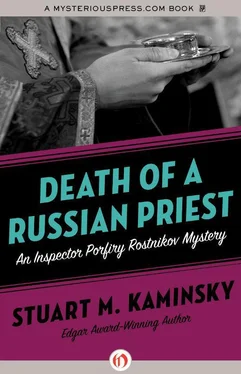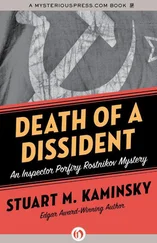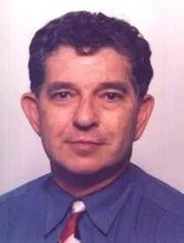Stuart Kaminsky - Death Of A Russian Priest
Здесь есть возможность читать онлайн «Stuart Kaminsky - Death Of A Russian Priest» весь текст электронной книги совершенно бесплатно (целиком полную версию без сокращений). В некоторых случаях можно слушать аудио, скачать через торрент в формате fb2 и присутствует краткое содержание. Год выпуска: 2012, Жанр: Полицейский детектив, на английском языке. Описание произведения, (предисловие) а так же отзывы посетителей доступны на портале библиотеки ЛибКат.
- Название:Death Of A Russian Priest
- Автор:
- Жанр:
- Год:2012
- ISBN:нет данных
- Рейтинг книги:3 / 5. Голосов: 1
-
Избранное:Добавить в избранное
- Отзывы:
-
Ваша оценка:
- 60
- 1
- 2
- 3
- 4
- 5
Death Of A Russian Priest: краткое содержание, описание и аннотация
Предлагаем к чтению аннотацию, описание, краткое содержание или предисловие (зависит от того, что написал сам автор книги «Death Of A Russian Priest»). Если вы не нашли необходимую информацию о книге — напишите в комментариях, мы постараемся отыскать её.
Death Of A Russian Priest — читать онлайн бесплатно полную книгу (весь текст) целиком
Ниже представлен текст книги, разбитый по страницам. Система сохранения места последней прочитанной страницы, позволяет с удобством читать онлайн бесплатно книгу «Death Of A Russian Priest», без необходимости каждый раз заново искать на чём Вы остановились. Поставьте закладку, и сможете в любой момент перейти на страницу, на которой закончили чтение.
Интервал:
Закладка:
Once again Rostnikov looked up.
“The son killed him. And then he killed the nun,” said Karpo.
“Emil,” said Rostnikov, with a great sigh, trying to inch his leg into a less distressed position. “The ‘voice of the Holy Mother’ told her. Are you telling me you now believe in religious visitations?”
“No,” said Karpo.
Rostnikov could see that his left eyebrow was definitely drooping slightly, a clear sign that the headache was mounting.
“But I spoke to the woman and believe that her judgment was sound, that her intuition was grounded not in faith but experience.”
“You liked the nun,” said Rostnikov.
“I respected her,” said Karpo. “There is a difference.”
Rostnikov said nothing. He continued to look at his deputy with no hint of a smile.
“I liked her,” Karpo admitted.
“Work, Emil Karpo. Work.”
Karpo, understanding that he was dismissed, went quickly out the door.
Rostnikov sat alone in the large room.
He flipped through more pages of the diary, pausing here and there but certain that Karpo had read it carefully in spite of the brief time it had been in his possession.
He stopped at the entry for Christmas 1962:
Father Merhum and his son have returned from Pochaev. He was called to protest the closing of the monastery. The son insisted on joining him. Two years ago there were one hundred and fifty monks in Pochaev Monastery. Many were forced by the government to return to their native regions. Others were tried for breaking the passport laws. And some who protested were given medical examinations, judged insane, and placed in asylums.
When Father Merhum reached Pochaev Monastery, there were thirty-seven monks still remaining, but a special commission of the USSR Council of Ministers came to the cloister and ordered the remaining monks to leave.
Father Merhum and the monks protested to Patriarch Aleksii in Moscow and to Khrushchev. Nothing. Ten protesting priests have been imprisoned. Novice Grigorii Unku, God rest his soul, has been tortured to death.
And then, just three days ago, the voluntary people’s militia of the Ternopol region came in trucks to beat the few remaining monks and priests and nuns and any who tried to help them. Armed KGB agents tore down the doors with iron bars, dragged the monks out by their legs, threw them in trucks, and drove them away while the people of the town who had gathered were driven back by water from hoses.
Father Merhum has been hurt, but he does not complain. He has ribs which are broken. Though he had vowed to observe only, the son, too, bears a scar from trying to protect the father. His chest shall carry this stigmata, and I pray to our Lord that each time he looks in the mirror he will be reminded of this desecration of the birthday of our Redeemer.
“You want to see me?” came a voice.
Rostnikov had heard the boy enter, but had chosen not to look up. He had never heard of the Pochaev Monastery, though he knew many such incidents had taken place. He closed the book and put it to one side.
The boy, grandson of Father Merhum, son of Peotor, stood at near attention, his eyes blinking as if stung by onions. He wore rough pants and a blue sweater at least a size too large. His hair was uncombed.
“Please sit, Aleksandr Merhum,” Rostnikov said.
The boy sat nervously. Rostnikov watched his eyes move to the book and then turn abruptly away, as if he had witnessed something forbidden.
“Do you know what happened?” Rostnikov asked.
“Sister Nina is dead.”
Rostnikov did not have to ask what the boy thought of the murdered nun. It was there in his face, body, and the weakness of his voice. “And what do you think?” he asked, allowing his hand to rest on Sister Nina’s journal.
The boy paused and then said, “It is not right. It is not fair. Whoever did it should have his eyes poked out with a twig.”
“Life is not fair, Aleksandr Merhum. I discovered that fact when I was a soldier not much older than you are. You see I had built a long list of wrongs that remained to be righted. I carried these injustices with me night and day. They made me very heavy. And then I realized. Life is not fair. It was a great relief.”
“Sister Nina says … said things like that.”
“You want some tea?”
“No,” the boy answered.
Rostnikov stirred sugar lumps into his tea and said, “Since yesterday I have been trying to remember the house in which I lived with my parents when I was your age. What it looked like, where my bed was, who I played with.”
“Why?” asked the boy.
“If I lose yesterday,” Rostnikov said with a smile, “I may lose today. And if I lose today, then what will tomorrow be worth?”
“You are a strange policeman,” said the boy. “And I know what you are doing. You think my father killed Sister Nina. My father wouldn’t kill her. He wouldn’t hurt her.”
“And what makes you think I believe he would hurt her?” asked Rostnikov, massaging his leg.
“You are looking for him. Tovarish Gonsk, the policeman, and the … other policeman with you, they are looking for him. They told my mother. They can’t find him. They think he ran away.”
“Did he?”
“I … no.”
“Have you ever seen this book, Aleksandr?” Rostnikov held up Sister Nina’s journal.
Alexander’s mouth opened just a bit and then he closed it again. “No.”
“Did your grandfather have a book like this, one he kept notes in?”
“I don’t know.”
“I can tell when people have secrets,” Rostnikov said. “It’s part of being a policeman. Secrets cry to be shared and policemen keep them well. If we didn’t, people would never trust us.”
“People don’t tru-” the boy began, and then stopped himself.
“I’m a different kind of policeman, a strange policeman, remember?”
“Yes.”
“Think about it.”
“I-”
“Where is your mother?”
“Outside, waiting,” the boy said.
“Go tell her to come in.”
The boy got off the chair quickly and hurried to the door. He reached for the handle then turned back to the policeman. “You want me to come back with her?”
“No,” said Rostnikov. “You can go to school.”
“There is no school today. They closed the school because of my grandfather and Sister Nina. The streets are full of people from the city.”
“Then play,” said Rostnikov.
“My mother is very frightened,” said the boy.
“I will be gentle.”
“I’m going to the church,” the boy said, and went through the door and into the street.
Rostnikov wanted to read more of the nun’s journal, but he had no time. The wife of Peotor Merhum must, indeed, have been standing directly outside the door, for she came in only seconds after her son had left.
Sonia Merhum was not what Rostnikov had expected, but that did not disturb him, for he had learned long ago not to be caught short by his expectations.
The woman was somewhere between thirty and forty years old, certainly older than her husband, but her beauty made it impossible to determine to which decade she was closer. She was tall, and her blond hair was cut short. Her body was full and firm, and she wore a plain dress of blue with white flowers printed upon it. As she approached, Rostnikov could see that her skin was perfectly smooth and unblemished and her mouth full and wide. Though the boy had spoken of his mother’s fear, Rostnikov could see none of it on her face as she moved to the chair across from him and sat like an uninvolved spectator at a trial.
“Sonia Merhum, wife of Peotor Merhum?” he asked.
The woman nodded.
“Would you like some tea? I am afraid it is no longer really hot.”
Читать дальшеИнтервал:
Закладка:
Похожие книги на «Death Of A Russian Priest»
Представляем Вашему вниманию похожие книги на «Death Of A Russian Priest» списком для выбора. Мы отобрали схожую по названию и смыслу литературу в надежде предоставить читателям больше вариантов отыскать новые, интересные, ещё непрочитанные произведения.
Обсуждение, отзывы о книге «Death Of A Russian Priest» и просто собственные мнения читателей. Оставьте ваши комментарии, напишите, что Вы думаете о произведении, его смысле или главных героях. Укажите что конкретно понравилось, а что нет, и почему Вы так считаете.












